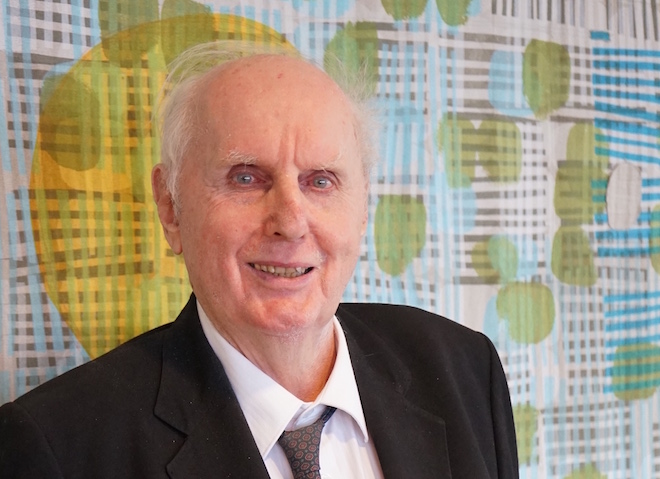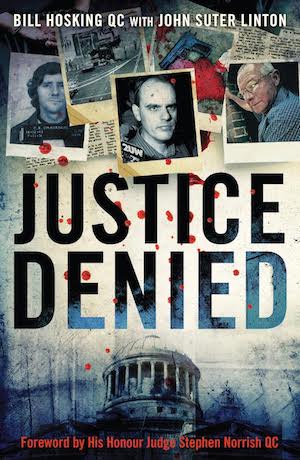Bill Hosking
 On the Couch •
On the Couch •  Thursday, March 9, 2017
Thursday, March 9, 2017 Public defender, judge and author Bill Hosking QC is on the couch, clutching his new book Justice Denied ... Crime and injustice is the theme ... Heroic trials recalled and brought back to life ... Some bad cops have their moment in the spotlight
 Hosking: fallibility of the system
Hosking: fallibility of the system
BILL Hosking QC has been a barrister, public defender and District Court judge. He was also private secretary to a number of well known state politicians, including Ministers for Justice Jack Mannix and John Maddison, and Premier Robin Askin (assistant private secretary).
He acted as defence counsel in the famous Jimmy Driscoll case, he appeared for Tim Anderson at an inquiry conducted by Justice James Wood, for the great hoodwinker Carl Synnerdahl, and for Michael Murphy one of Anita Cobby's murderers, among many others.
Police verbals, suppression of evidence, limitations of the trial system, admission of false confessions and miscarriages of justice are all closely observed by Hosking. He also saw the law and its procedures change as a result of some shocking injustices.
Now Hosking, along with journalist and screen-writer John Suter Linton, has assembled some of his experiences into Justice Denied where he presents 13 studies of important criminal cases.
He's also agreed to climb onto the couch and allow us to find out about the man behind the book.
Describe yourself in three words.
Kind, loyal, conscientious.
What are you currently reading?
John Howard - "The Menzies Era".
What's your favourite film?
Casablanca.
Who has been the most influential person in your life?
My late wife, Judith.
When were you happiest?
Between 1973 and 1987 - because I became a father and began working as a public defender for 14 years.
What is your favourite piece of music?
"1812 Overture."
 Why did you write "Justice Denied"?
Why did you write "Justice Denied"?
A longstanding (30-years plus) desire to share my passion, experience and involvement with criminal law. A little partisan commentary. A call to be vigilant in protecting our individual rights. And a plea to restore remissions on sentences and restore the right to make a statement from the dock.
Even though there have been enormous changes in criminal law, is justice still denied?
Yes, and it will always be that way. Justice is administered by human beings with all the fallibility that entails, which is its strength as well as its weakness.
What is in your refrigerator?
That is a cruel, invasive question which I skilfully evade by putting the blame on my research assistant, Kaye McDougal, a resident of Lismore. Apart from frozen gourmet meals, a spot check to draft this reply finds its contents, the result of her monthly visits, are boringly orthodox: Flora (butter not allowed), milk (full strength), four eggs (free range), beer, yoghurt and ice-cream (not necessarily in that order), expensive red wine, green vegetables and frozen chips.
What makes you frightened?
I tremble at the thought of what inferences can be drawn from the following truthful answer to a blatantly unfair question. Answer: roosters (not the rugby league variety). Indeed, anything with feathers on it, except at the bar when I enjoyed jousting with opponents whose feathers I had ruffled. Get it?
Do you think judges have a lot to answer for?
Yes. In a real sense, judges are public servants whose preferment to the executive is cast from a majority of those in parliament; put there by the votes of their real masters, the people.
Have you ever witnessed corruption in the criminal justice system?
No. That is unequivocal.
Who would you most like to be with in a lift that has broken down?
Another tricky question. My response is typical of a lawyer - to answer a question with a question. It depends on how long the break down is for. If of short duration, Mae West. Or to be more modern, Marilyn Monroe. If longer, both. To give a serious considered answer, my grandmother on my father's side of the family. A wise and dignified old lady who would calm all, even if she were scared herself.
Why law, and not another worthwhile pursuit in life?
I don't know. It was a childhood passion that developed from an age when I would have thought a red judge was a character from "Alice in Wonderland".
What is the case of which you are most proud as a barrister?
This is not intended as a clichéd answer, but it may be. A barrister should be proud of his or her performance in every case they do. Inevitably one seeks to take credit where it is not due. For me there are three cases which are told in Justice Denied: Jimmy Driscoll (chapter one), Lady Chatterley's Lover (chapter two) and Tim Anderson (chapter eleven).
In Driscoll and Tim Anderson I was very much one of a team, and in the former, the junior only took over at the very end. In Lady Chatterley's, I worked on my own.
What was your most interesting case as a judge?
I have selected the Quayle case, which was a civil action listed before me in the District Court quite by accident at my birthplace in Broken Hill. I was sitting without a jury. A family of four, a mum and her three surviving adult sons, one of whom was in the local gaol, sued the NSW government. One member of the family had died under suspicious circumstances in the police cells at desolate Wilcannia. His poor family somehow was able to brief a top silk. The State had all the resources to fight the case - which they did. It became a landmark case and ended up in the law reports as a decision of precedence. The case was superbly presented but faced the formidable obstacle that grief, however great, was not enough for monetary compensation. The Quayle family had to establish not only police misconduct but that each member had suffered personal injury. In all four cases nervous shock was actually proven and I awarded heavy damages. There was racial prejudice to be ignored and natural sympathy for the family to be put to one side. I think I got it right, I hope so. There was no appeal.
What was the most important opportunity you didn't take?
Not having the courage to resign as deputy senior public defender when attorney general Paul Landa refused my application for 12-months unpaid leave to accept an appointment to be a judge of the Papua New Guinea National Court.
If you were on death row, what would you request for your last meal?
Given one's diminished appetite under such circumstances and not withstanding my GP's admonition to the contrary I would ask for "a double scotch, but without ice, please".
If you were a foodstuff, what would you be?
Absolutely not fish, fowl or animal. The life of all food items is limited and when you consider the ultimate destination distinctly unexciting. I would select an apple.
Who do you most admire professionally?
It's a dead-heat between The Honourable Justice Jane Matthews AO and Sir Laurence Street.
What is your favourite word?
Love.
What would you change about Australia?
Very little. We have a fine constitutional monarchy. My impossible dream is greater equality, less poverty and less pain.
What would your epitaph say?
He tried.
What comes into your mind when you shut your eyes and think of the word "law"?
Fairness and courtesy - the majesty and power of the State combined with compassion and sympathy for the underdog. The classic symbol of the even scales of justice embodies equality from the grandeur of the high court palace in Canberra to the tiny wood and iron courtroom at Peak Hill. The law is the same in both, yet invisible. The law goes far beyond the written statute or precedent, massive law libraries or computer bank. It comes from within us all with the sole noble objective of justice.
Justice Denied is published by Harlequin. RRP $24.74
 Crime,
Crime,  NSW District Court
NSW District Court 









Reader Comments